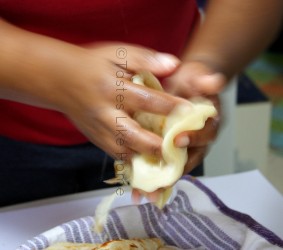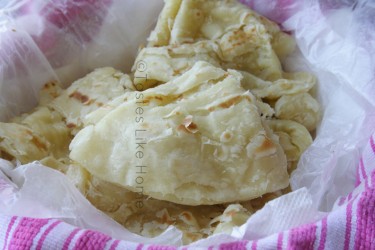Hi Everyone, “Long ago, roti used to clap, ply ply… nowadays is share mug shake… sigh.” Gordon Moseley (Facebook posting July 28, 7.36 p.m.).
What do you do when you make roti these days? Do you clap it or do you shake it in a mug? Me? I am a clapper. I tried the mug shaking once and was disappointed with the outcome.
 The whole point of the long process of making paratha roti is ultimately to enjoy the texture of the roti – leafy, flaky, tender, and soft. As I have said before in a previous column, roti is best enjoyed and eaten when it has just finished cooking hot off the tawah, that is also the lure of paratha roti. The rolling out and brushing of the dough with oil or ghee and then rolling up the dough is about creating layers when the roti is cooked. Clapping the cooked roti releases the steam trapped in the roti thus creating layers of tenderness. Tiny flakes sprinkle in the bowl or basket and the surrounding countertop as a result of the clapping. On the other hand, when the hot, cooked roti is added to a mug with a cover, and shaken, the roti is broken up into large pieces. The texture of the roti is different. There is a difference between clapping the roti and shaking the roti in a jug.
The whole point of the long process of making paratha roti is ultimately to enjoy the texture of the roti – leafy, flaky, tender, and soft. As I have said before in a previous column, roti is best enjoyed and eaten when it has just finished cooking hot off the tawah, that is also the lure of paratha roti. The rolling out and brushing of the dough with oil or ghee and then rolling up the dough is about creating layers when the roti is cooked. Clapping the cooked roti releases the steam trapped in the roti thus creating layers of tenderness. Tiny flakes sprinkle in the bowl or basket and the surrounding countertop as a result of the clapping. On the other hand, when the hot, cooked roti is added to a mug with a cover, and shaken, the roti is broken up into large pieces. The texture of the roti is different. There is a difference between clapping the roti and shaking the roti in a jug.
When a roti is clapped the cook has visual and physical control of the degree to which the roti is clapped. In other words, the cook sees the layers of the roti between clapping and determines when to stop clapping so that the roti retains its shape. This is particularly important if the roti is meant to act as a wrapper for curried vegetables or meat. Clapping the roti enables one to not over-clap the roti. Over clapping alters the texture.
Shaking the roti in a covered mug is void of the sensory control of sight, therefore, over-shaking occurs and the roti is broken up rather than leafed. If the desire is to make Trini-style buss-up-shut (large pieces of broken up paratha) then shaking is the ideal option!


It was revealing reading the comments made on Facebook, most people still preferred to clap their roti while others opted for shaking, mostly out of fear of the heat on their hands (understandably so). If you make roti regularly, one builds up a resistance to that sort of thing – heat. Actually, most cooks will tell you that they have asbestos hands (laugh). People referred to the mug shaking (of roti) as modern times and being better “…because it saves the clapper later on in life.” I’ve often wondered if there are any long terms negative effects caused by all the clapping of the hot, hot roti. Over the years I have asked many people who are long-term roti-clappers if they suffered any negative effects. None came up. If you know of any effects, please share.
One thing I was told was that it was important to take care of one’s hands. When you finish clapping all the roti, do not immediately wash your hands or put it in water. Take a slightly damp towel and wipe your hands. Let the hands cool down before washing them. I am not going to lie, sometimes I am so glad for the relief of feeling the cool water on my hands that I wash them right away. I try often to wipe with the damp cloth though.
There is no getting away from the heat if you are a roti clapper because the roti must be clapped as soon as if it removed from the tawah. If you allow the roti to cool, then the texture of the roti will be altered when it is eventually clapped, and it will break rather than stay as a leafy sheet. It has to be hot for the trapped steam to escape, and that is where the heat lies, in the steam. My aunt Golin used to clap her roti immediately by lifting it off of the hot tawah. Bless her. I, on the other hand, remove the roti from the tawah and rest it in the bowl for about 5 seconds before I clap the roti. 5 seconds may not seem like much but it makes a difference to me.
One woman said in response to the post: “dis time nah lang time”. In other words, these are modern times and we don’t clap roti any more, we shake it!
So, do you clap your roti or shake it in a mug? Can you tell the difference between a roti that has been clapped and one that has been shaken? Tell me. I want to know.
Cynthia









